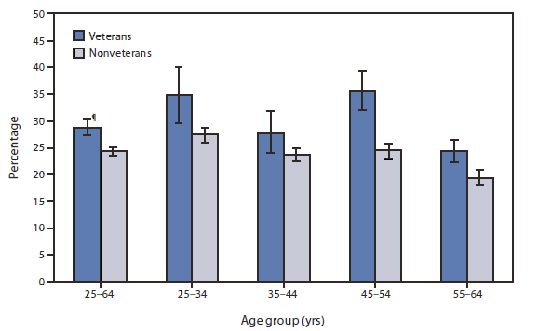Persons using assistive technology might not be able to fully access information in this file. For assistance, please send e-mail to: mmwrq@cdc.gov. Type 508 Accommodation and the title of the report in the subject line of e-mail.
QuickStats: Current Smoking* Among Men Aged 25–64 Years, by Age Group and Veteran Status† — National Health Interview Survey (NHIS), United States, 2007–2010§

* Defined as having smoked at least 100 cigarettes in their lifetime and now smoke everyday or some days.
† In NHIS, veterans identify themselves by responding "yes" to the question "Have you ever been honorably discharged from active duty in the U.S. Army, Navy, Air Force, Marine Corps, or Coast Guard?" During 2007–2010, veterans accounted for 15% of the male population aged 25–64 years, ranging from 6% among men aged 25–34 years to 34% for those aged 55–64 years.
§ Estimates are based on household interviews of a sample of the civilian, noninstitutionalized U.S. population and are derived from the NHIS sample adult component.
¶ 95% confidence interval.
During 2007–2010, male veterans aged 25–64 years were more likely to be current smokers than nonveterans (29% versus 24%). Among men aged 45–54 years, 36% of veterans reported being current smokers, compared with 24% of nonveterans.
Source: National Health Interview Survey, 2007–2010. Available at http://www.cdc.gov/nchs/nhis.htm.
Reported by: Ellen A. Kramarow, PhD, ekramarow@cdc.gov, 301-458-4325; Patricia N. Pastor, PhD.
Alternate Text: The figure above shows current smoking among men aged 25-64 years, by age group and veteran status in the United States, during 2007-2010. During 2007-2010, male veterans aged 25-64 years were more likely to be current smokers than nonveterans (29% versus 24%). Among men aged 45-54 years, 36% of veterans reported being current smokers, compared with 24% of nonveterans.
Use of trade names and commercial sources is for identification only and does not imply endorsement by the U.S. Department of
Health and Human Services.
References to non-CDC sites on the Internet are
provided as a service to MMWR readers and do not constitute or imply
endorsement of these organizations or their programs by CDC or the U.S.
Department of Health and Human Services. CDC is not responsible for the content
of pages found at these sites. URL addresses listed in MMWR were current as of
the date of publication.
All MMWR HTML versions of articles are electronic conversions from typeset documents.
This conversion might result in character translation or format errors in the HTML version.
Users are referred to the electronic PDF version (http://www.cdc.gov/mmwr)
and/or the original MMWR paper copy for printable versions of official text, figures, and tables.
An original paper copy of this issue can be obtained from the Superintendent of Documents, U.S.
Government Printing Office (GPO), Washington, DC 20402-9371;
telephone: (202) 512-1800. Contact GPO for current prices.
**Questions or messages regarding errors in formatting should be addressed to
mmwrq@cdc.gov.
 ShareCompartir
ShareCompartir


